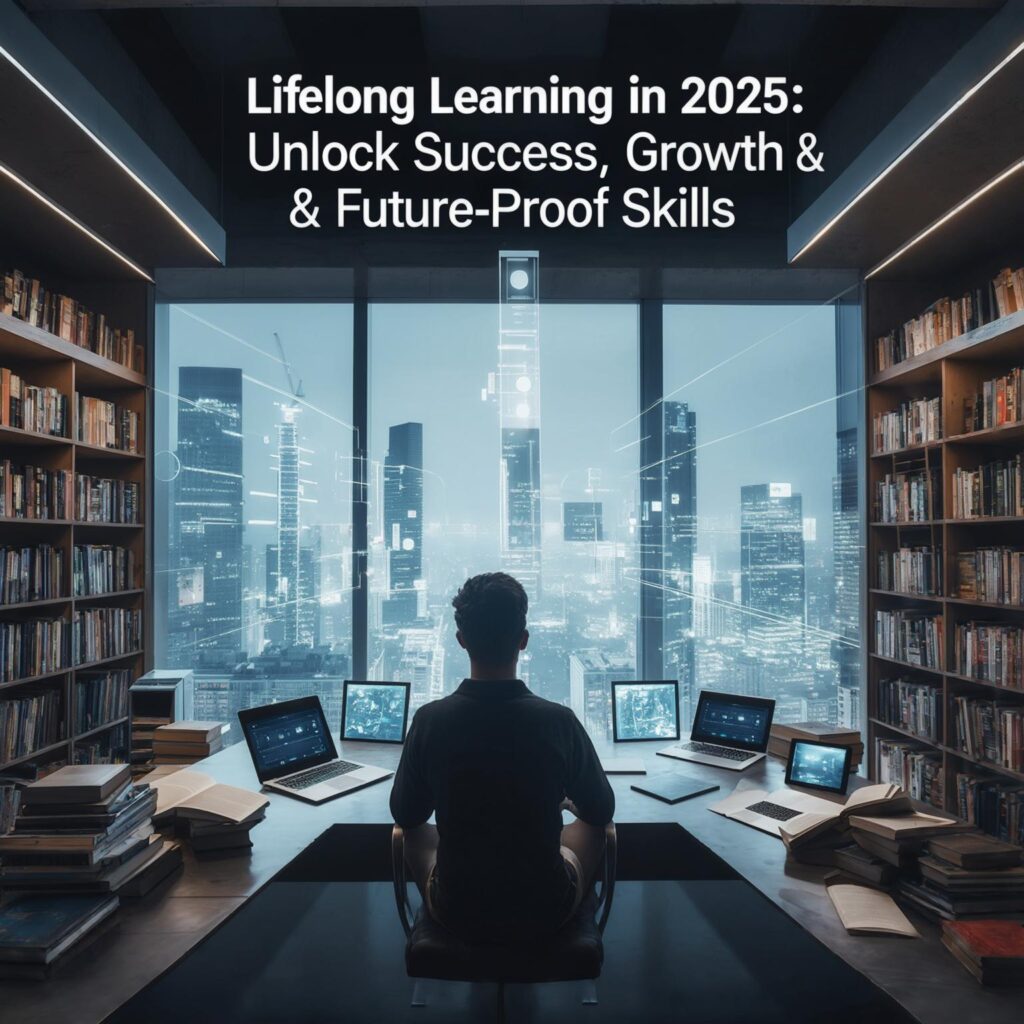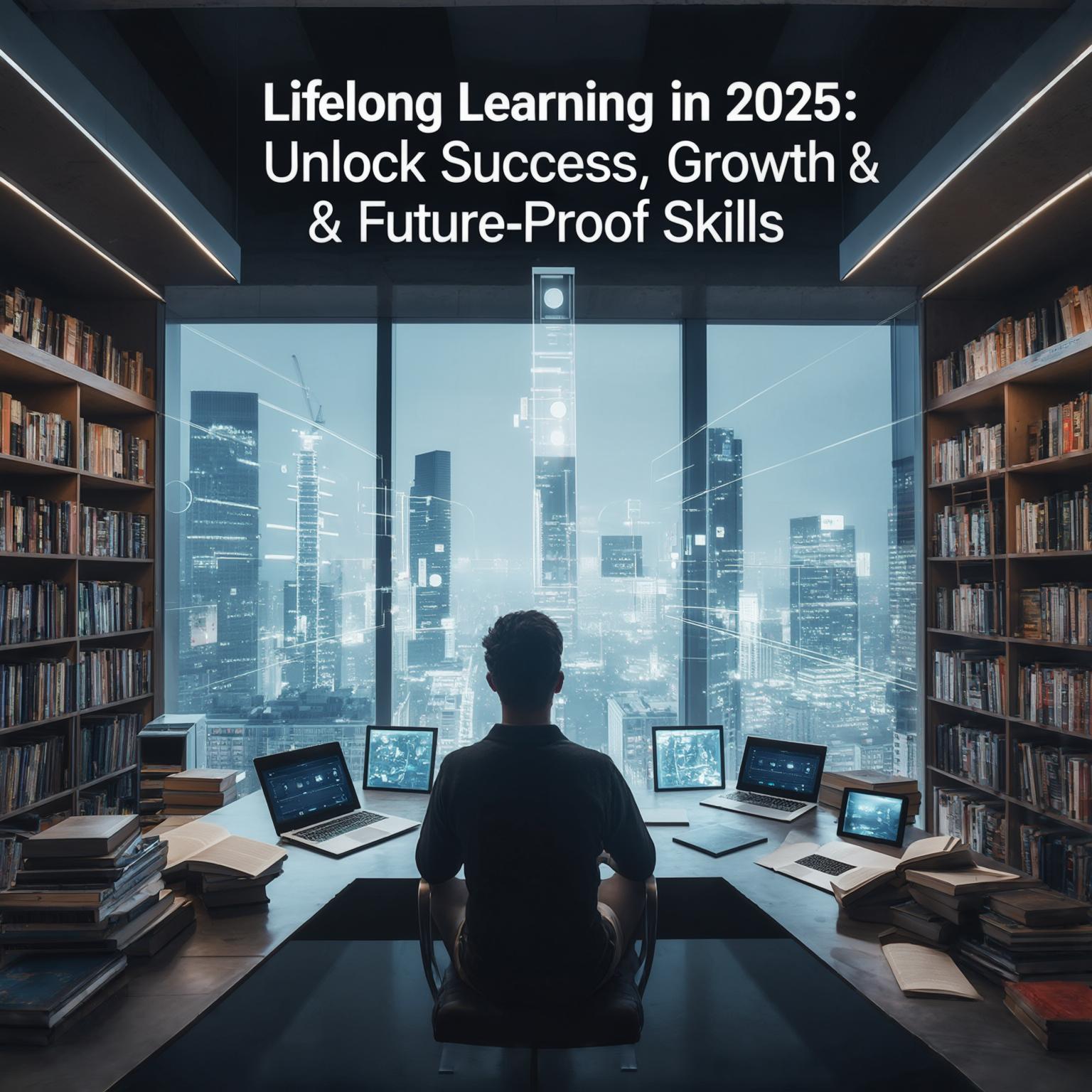Lifelong Learning in 2025: Unlock Success, Growth & Future-Proof Skills
In a more dynamic world, with technological innovation, global interconnectivity, and new industries altering the game on how we live and work, lifelong learning is no longer an academic nicety but an imperative absolute. With our journey moving forward in 2025 and beyond, the capacity to learn, unlearn, and continue to relearn will be the gold standard of personal development, professional achievement, and societal resilience.

UNDERSTANDING LIFELONG LEARNING
Lifelong learning refers to the continuous, spontaneous, and voluntary acquisition of knowledge for personal or professional purposes. It encompasses formal education, informal learning through experience, learning on the web, reading, mentoring, and skills training in the guise of skills. In essence, it’s all about developing an attitude of learning which cannot cease.
Compared to the traditional system of education which is fundamentally front-loaded (childhood and youth and work and schooling), lifelong learning enables a lifelong process of learning throughout life. This type of philosophy is optimally relevant to the world in the 21st century.
WHY LIFELONG LEARNING IS SO ESSENTIAL IN 2025
- THE ACCELERATION OF TECHNOLOGICAL CHANGE
In 2025, businesses go digital at lightning speeds using tools such as artificial intelligence, machine learning, blockchain, robots, and quantum computing. Such digital disruption renders skills valuable a few years ago useless now.
In a bid to remain in the talent pool, workers must continually upskill their digital and soft skills. An estimated 50% of the total workforce will need to be reskilled by 2025, according to the World Economic Forum. Life-long learning is not just a good idea in this arrangement—it’s a necessity.
- THE MOVE TOWARDS SKILL-BASED RECRUITMENT
Workers are no longer looking for degrees but skill sets. Credentialism is being replaced with competency hiring, where one’s experience and skills obtained are valued over a certificate. Websites such as Coursera, edX, and LinkedIn Learning provide cheap routes for obtaining and presenting such skills.
This tendency makes individuals embark on micro-credentials, short courses, and certifications to stay current. Lifelong learning helps one change careers, transition into new jobs, or gain complex skills without going to college.
- LONGER WORKING LIVES AND THE NEED FOR REINVENTION
They work longer and hence live longer. A career may thus span 40 to 50 years, where one would have seen many a career change. This truth necessitates a reinvention mode at all times.
For example, a young job entrant joining the profession as a marketer could shift careers to data analysis or entrepreneurship in the future. Without learning and adaptability, it is hard to make such a career shift. Long-term learning makes individuals flexible, adaptable, and forward-thinking working world by making them adaptive, flexible, and forward-thinking people.
ADVANTAGES OF LIFE-LONG LEARNING
- PERSONAL SATISFACTION AND SELF-ASSURANC
Acquiring something new—a language, a musical instrument, or leadership skill—heightens the feeling of accomplishment and boosts self-confidence. Being open-minded, questioning, and responsive is the essence of lifelong learners. They benefit from improved mental health, brain power, and emotional resilience.
- IMPROVED EMPLOYABILITY
Employers prefer those willing to learn and adapt. These are the initiative and learning disposition qualities, which are very important under fast situations. People who keep learning throughout their lives are good problem solvers, team members, and thinkers.
- ECONOMIC RESILIENC
In a time of economic instability and automation, lifelong learning provides individuals with the ability to adapt during recessions or begin entrepreneurship. Continuing learners won’t be caught off guard by industry disruption or economic declines.
KEY LIFELONG LEARNING SECTORS IN 2025
- DIGITAL LITERACY AND TECHNOLOGICAL COMPETENCIES
With technology flowing into all areas, digital literacy is the bread and butter. These are skills such as data analysis, cybersecurity, cloud computing, and AI. Even non-technical experts have to be familiar with digital tools, platforms, and processes.
- SOFT SKILLS AND HUMAN-CENTERED COMPETENCIES
Hiring supervisors are seeking some of the most effective empathy, communication, critical thinking, and flexibility skills. These people-oriented competencies are difficult to automate with technology and are crucial to leadership and collaboration.
- ENTREPRENEURSHIP AND INNOVATION
As the gig economy continues to thrive, people are stepping out in hordes to become freelancers or entrepreneurs. One needs to understand business models, digital marketing, financial literacy, and project management. With lifelong learning, people can establish and develop businesses with confidence.
- ENVIRONMENTAL AND SOCIAL AWARENESS
Climate change, sustainability, and ethical leadership are common issues. As a citizen and a good professional, it is easier to make the world sustainable and fair by knowing stewardship of the environment, social responsibility, and ethical decision-making.
HOW TO EMBRACE LIFELONG LEARNING
- CULTIVATE A GROWTH MINDSET
Maintain the notion that ability and intelligence may be learned by effort and will power. See challenges as a chance, and criticism as a tool for learning. This is the key to lifelong learning.
- LEARN TO USE ONLINE LEARNING PLATFORMS
Online learning platforms such as Udemy, Skillshare, and Khan Academy provide the possibility of learning anywhere. From career development, to creative pursuits, there is a course for almost anything.
Set objectives, establish a routine, and dedicate 30 minutes per day to learning, even just a little. The long-term effect of daily study can be incredible.
- JOIN LEARNING COMMUNITIES
Learning in groups enhances retention, motivation, and accountability. Engage in study groups, forums, workshops, or topic-based community meetups. Discussion sharpens your knowledge and creates networking opportunities.
- REFLECT AND APPLY WHAT YOU LEARN
Learning becomes effective only when put into practice. After learning, identify ways to implement it—on the job, at home, or via volunteering. Reflecting makes learning and confidence more solid.
THE ROLE OF THE INSTITUTIONS IN ENCOURAGING LIFELONG LEARNING
- EDUCATION INSTITUTIONS MUST CHANGE
Education institutions must change to modular, flexible learning qualifications complementary to lifelong learning. This involves lifetime alumni access to buildings, modular qualifications, and business alliances that update curricula.
- BUSINESSES MUST LEAD STAFF DEVELOPMENT
Firms gain from having an educated and adaptable workforce. Through training in firms, upskilling initiatives, and education incentives, firms are capable of enhancing retention and innovation.
- GOVERNMENTS MUST PROVIDE HIGHEST PRIORITY TO ACCESSIBILITY
Policy makers must promote lifelong learning by investing in digital infrastructure, subsidizing the education sector, and establishing public learning facilities. Learning on an equal basis ensures no one will be left behind in the future economy.
LIFELONG LEARNING IN A POST-PANDEMIC WORLD
The COVID-19 pandemic underscored the need for adaptability. Millions were forced to rethink careers, learn new skills, or navigate unfamiliar technologies. In the aftermath, the importance of self-directed, flexible learning became clear. The post-pandemic world is now a testament to how vital lifelong learning is for both resilience and recovery.
CONCLUSION: LEARNING IS NO LONGER A PHASE—IT’S A LIFESTYLE
By 2025 and beyond, lifelong learning is no longer a fantasy but a strategic imperative. Whether you are a student poised to enter the workforce, an in-their-prime professional seeking to remain current, or a retiree who wants to stay engaged with the mind, continuous learning is the guide that will navigate you through a transformational landscape.
While we face tough challenges outside our borders and unprecedented opportunity, the most effective individuals and nations will be those that never quit learning. Ongoing learning is the gateway to potential and performance, to doubt and opportunity.

